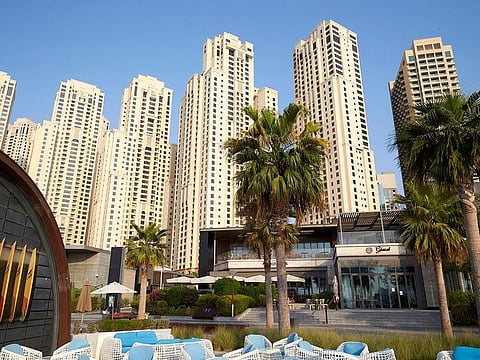Dubai's housing shift: How hostel-like room partitions are straining Jumeirah Beach Residence and beyond
Overcrowded rooms, filthy common areas, and safety risks spark alarm among JBR residents

Dubai: In the heart of Dubai's prestigious Jumeirah Beach Residence (JBR), a growing crisis is unfolding, threatening the very fabric of the community. Dr Waddah Shibib, a German national and long-term resident, is sounding the alarm about what he describes as a "severe disruption" to the area since the end of the COVID-19 pandemic. For over two decades, Dr Shibib, an orthopaedic specialist, has called JBR home, but what was once a peaceful and upscale residential area is now struggling with severe overcrowding due to the rise of hostel-like conversions within the towers.
JBR, a prime location known for its stunning views and luxurious lifestyle, is home to almost 7,000 apartments across 30 towers. However, recent reports indicate that some of these once-quiet residences have been transformed into makeshift hostels, often without the consent of their original owners.
From luxury to chaos
According to Dr Shibib, many 3- and 4-bedroom apartments are being rented out by hostels for as low as Dh50 to Dh100 per night, providing temporary beds to budget travelers. These units, originally designed for families, are now crammed with up to 60 people per apartment, often with makeshift partition walls to create additional rooms.
"I have seen up to 10 people sleeping in one room, and others in the living areas," Dr Shibib said. "The common areas, like the lifts, are constantly overcrowded, and you can be waiting up to 30 minutes just to get to your floor."
The damage caused by this overcrowding extends beyond the inconvenience of waiting for lifts. The hygiene of the building has taken a drastic downturn. Dr Shibib notes that the lifts are often out of order, covered in trash, and filled with unpleasant odors. Worse yet, there are increasing reports of smoking in the common areas, creating a less-than-family-friendly atmosphere.
Safety concerns mounting
Dr Shibib’s concerns don't stop at cleanliness; he fears for the safety of all residents. "The lifts are constantly out of order. The sewage system is under strain. We're constantly facing a high influx of strangers, many of whom aren't residents. There’s no security. This is not just an inconvenience—it's a safety hazard," he said.
In addition to the daily challenges, Dr Shibib also fears the potential risk of a fire. Given the sheer number of people crammed into small spaces, coupled with the overcrowded conditions in the lifts and common areas, he believes the JBR towers could face devastating consequences in the event of an emergency.
The ripple effect: Property values plummet
The rise of these hostel-like conversions is also taking a toll on property values. "Who would want to buy a property in this condition?" Dr Shibib asks, pointing to the constant turnover of people, the degradation of shared spaces, and the overall atmosphere of neglect.
Dr Shibib goes on to add that many property owners are unable to sell their apartments at reasonable prices, with potential buyers being deterred by the visible deterioration of the building’s conditions.
A wider problem across Dubai
While JBR is at the forefront of the overcrowding issue, it’s far from isolated. Discovery Gardens, popular for its proximity to the Metro, has become a hotspot for budget housing, attracting workers and newcomers looking for affordable options close to public transport.
One resident, who wished to remain anonymous, shared the dire situation: "A one-bedroom apartment, originally designed for a small family, now hosts 18 people. I pay Dh1,700 for a bedspace, including Dewa and Wi-Fi. It’s too much for a small space, but it’s the only option I have," the resident explained. "There’s no privacy, and we have to share the toilet with so many people. It’s tough, but my salary doesn’t allow for anything better."
This overcrowding isn’t just a personal hardship—it’s putting a strain on Dubai’s infrastructure. Public transport, sewage systems, and emergency services are all running on overdrive to handle the pressure, highlighting how this crisis extends far beyond individual apartments.
Solutions: A call for action
Both Dr Shibib and other concerned residents are calling for urgent action to restore order to JBR and other affected areas. They suggest a multi-faceted approach, including stricter regulation and enforcement around the conversion of residential units into hostels, as well as enhanced security measures to ensure the safety of long-term residents.
"I understand the need for affordable housing, but this is not the solution," Dr Shibib asserts. "We need legal protections for long-term residents and a commitment from the authorities to preserve the integrity of Dubai’s residential communities."
Residents are also calling for better monitoring and regulation of short-term rental platforms, which they argue have contributed to the increase in overcrowded conditions. Moreover, stricter penalties for those operating illegal hostels and more active involvement from property developers and homeowners associations are critical to preventing further decline.
As Dubai expands, the pressure to balance affordable housing with maintaining the luxury and safety of communities like JBR is mounting. What’s the real solution to preserving the quality of life in these iconic neighborhoods?
Also Read: Is subletting legal in Dubai? Know the rules
Sign up for the Daily Briefing
Get the latest news and updates straight to your inbox



